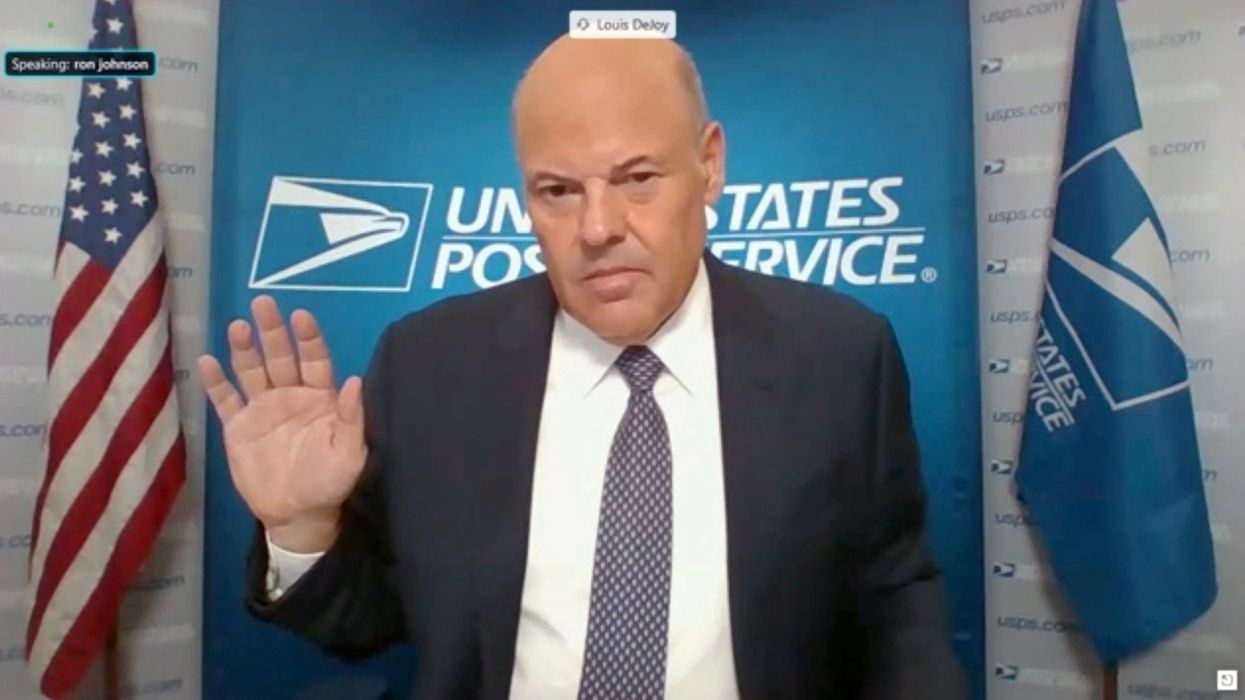Postmaster General Louis DeJoy promised on Friday that the Postal Service would fulfill its "sacred duty" to deliver election mail this fall and said he was "extremely highly confident" that even mail-in ballots sent close to Election Day would be delivered on time.
In the first of his two appearances before Congress this month, the embattled postmaster sought to tamp down public outcry over cutbacks and to rebut allegations by Democrats and voting rights groups that he's collaborating with President Trump in an extraordinary effort to undermine the integrity of the election.
DeJoy, a major Trump donor who became the nation's top postal official 10 weeks ago, testified to a Republican-majority Senate committee that he is not working on behalf of the White House. And "the insinuation is quite frankly outrageous," he declared, that he is out to ruin the central exercise of American democracy with policy changes rendering impossible the timely delivery and return of an unprecedented tens of millions of absentee ballots sure to be cast because of the pandemic.
"There have been no changes in any policies with regard to election mail for the 2020 election," he said during a virtual hearing of the Homeland Security and Governmental Affairs Committee. "The Postal Service is fully capable and committed to delivering the nation's election mail fully and on time."
He also pledged at one point that USPS would treat all ballot applications and returned voter envelopes as first class mail, which has top delivery priority, even if it is marked and paid for as slower service.
DeJoy, a former logistics executive, also testified he has not spoken with President Trump, Treasury Secretary Steve Mnuchin or White House Chief of Staff Mark Meadows about postal service changes and has not faced political pressure to reduce capacity for election mail.
The president has stoked concerns by deriding the Postal Service as a "joke" and repeatedly claiming without evidence that too many votes cast away from polling places will produce a fraudulent election. "The honorable thing to do is drop the Mail-In Scam before it is too late!" he tweeted last week, one of dozens such missives since the spring.
"The board's committed, the postal workers are committed, the union leadership is committed to having a successful election," DeJoy testified.
His recently implemented cost-cutting policies including cutbacks on overtime, reduced extra-delivery trips and removal of sorting machines and mailboxes. The changes spurred widespread anxiety about ballot delivery — especially as images went viral of truckloads of removed mailboxes, a roundup he said he did not know about in advance,
"When I found out about it," he said, "and looked at the excitement it was creating, I decided to stop it and we will pick it up after the election, but this is a normal process that has been around, it's been around 50 years."
A group of 90 House Democrats called on the Postal Service's board of governors in a letter Wednesday to rein in DeJoy and consider firing him if he did not reverse more cost-cutting moves than just those he said on Tuesday would be suspended until after the election. And on Friday six state attorneys general sued him and the Postal Service in federal court, alleging that changes at the USPS amounted to voting rights violations.
Adding to concerns over election readiness, the Postal Service last month warned 46 states their voters are at risk of being disenfranchised, since their deadlines for requesting and returning ballots are incompatible with mail delivery standards.
This notice had nothing particularly to do with the extraordinary circumstances of 2020, DeJoy said, and a similar letter is sent before every national election.
"This was not a change from anything we have done in previous years," he said. "It was just more detail and more emphasis put on it partly because of the expected rise in vote by mail and also because of the pandemic."
Asked if he supports voting by mail, DeJoy revealed that he plans to use the process to cast his ballot in North Carolina, which has no-excuse absentee voting. "I've voted by mail for a number of years," he said. "The Postal Service will deliver every ballot and process every ballot in time that it receives."
DeJoy is set to testify before the Democrat-led House Oversight and Reform Committee on Monday.
And on Saturday, the House is scheduled to interrupt its summer break long enough to vote on legislation that would deliver $25 billion to the USPS to address its budget troubles and also countermand many of the recent organizational changes. The Senate has no plans to vote on the measure.



















Trump & Hegseth gave Mark Kelly a huge 2028 gift